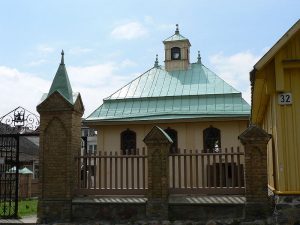Troki
A town in southeastern Lithuania, Trakai was home to many Jews as well as to the most ancient and important Karaite community in the Polish–Lithuanian Commonwealth. The town was founded before 1321 and served as the ancient capital of the Grand Duchy of Lithuania. Known as Troki in Polish, and Trok in Yiddish, Trakai (its official Lithuanian name today) was in the Commonwealth until 1795, when it became part of the Russian Empire. Between 1922 and 1939 it belonged to the Polish Republic, and since 1939 it has been part of the Republic of Lithuania. It is located 25 km west of Vilnius.
The Karaite community of Trakai was founded by Grand Duke Vitold (Vytautas), who transferred several hundred Karaite families from Crimea to serve him. Though the date of this event is traditionally cited as 1392, Vitold had granted a privilege to the Jews of Trakai four years earlier, in a document later considered applicable to the Karaites. “Rabbinite” Jews (who practiced rabbinic rather than scripture-based Judaism) and Karaites would sometimes cooperate on issues involving privileges. In 1441, Casimir IV granted Magdeburg law to the town and its Karaites, thus making Trakai the only town in which the group’s judicial status differed from that of Rabbinite Jews.
In 1495, the Karaites of Trakai were expelled, with the other Jews, as a part of the general expulsion of Jews from the Grand Duchy of Lithuania. Both communities returned to Trakai after the cancellation of this order in 1503. In 1516, Grand Duke Sigismund the Old allowed “all the Jews” of Trakai to hold two annual fairs, events that improved the town’s economy. Regulations of the Karaite Council of Lithuania convened at Trakai in 1553 were brought to Grodno (mod. Hrodna, Belarus) for confirmation before the Jewish Council of Lithuania in 1568. After 1625, Jews began to settle in Trakai in larger numbers.
Relations between Karaites and Rabbinites were always characterized by tension and competition as well as cooperation. In 1646, the Karaites of Trakai obtained an order from King Vladislas IV, forbidding Jews to settle and compete with Karaites. Yet the two communities cooperated not only on the administrative level, but also in spiritual, religious, and judicial matters. They forged, for example, a common defense against a blood libel (1679–1680). Cooperation reached a peak in 1714 when the Karaites and Rabbinites of Trakai signed an agreement to settle their differences without appealing to gentile authorities. Some Karaite scholars lived in Trakai from the sixteenth through the eighteenth centuries, most notably Yitsḥak ben Avraham Troki, the author of Ḥizuk emunah (Strengthening the Faith; first printed in Latin in 1681 in Tela ignea satanae), a work that was widely used in Jewish–Christian religious polemics.
Trakai suffered badly during the Polish–Russian war of 1654–1667, leading to declines in both the Karaite and Rabbinite populations. A plague in 1710 caused further decimation and led to renewed tensions between the two groups. According to census figures, approximately 150 Jews and 300 Karaites lived in Trakai in 1765.
The population grew after 1804 when Russian authorities imposed regulations restricting Jews to the Pale region. At that point, many Jews were expelled from the rural periphery of Trakai and settled instead in the town. The Karaites of Trakai tried unsuccessfully to expel these refugees. In 1897, the town contained 377 Karaites and 1,112 Rabbinite Jews, out of a general population of 3,240. At the beginning of the twentieth century, the town supported a Jewish school, a Jewish bank, and a Jewish library. During the interwar period, hostility and self-imposed segregation prevailed between Karaites and Jews.
By 1939, the Jewish population had dwindled to approximately 300. During the Holocaust, the Nazis considered Karaites to be members of the “Turkish race,” and did not persecute them. Karaite leaders even submitted a list of all members of their community to the German authorities so as to prevent Rabbinites from infiltrating. By contrast, the Rabbinites of Trakai and its surroundings (numbering about 2,500) were deported on 30 November 1941 to an island on the lake of Trakai, where they were murdered. Today, approximately 20 families in the town identify themselves as Karaites, out of a population of 6,000. The Karaite kenesa (synagogue) has survived, and serves also as a museum of the Karaite community.
From: Yivo


